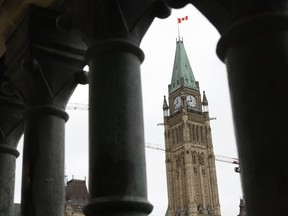
Article content
Once upon a time, the federal budget contents were a carefully guarded secret until the Finance Minister rose in the House of Commons to announce the budget. Secrecy is not a statutory requirement but, as pointed out by former house speaker John Fraser in 1987, “Budgetary secrecy is a matter of parliamentary convention. Its purpose is to prevent anybody from gaining a private advantage by reason of obtaining advance budgetary information.” So, again, budget secrecy is intended to prevent insiders from gaining an unfair advantage from advance knowledge of tax/spending measures, or from using market sensitive information.
THIS CONTENT IS RESERVED FOR SUBSCRIBERS ONLY
Subscribe now to read the latest news in your city and across Canada.
- Exclusive articles from Barbara Shecter, Joe O'Connor, Gabriel Friedman, and others.
- Daily content from Financial Times, the world's leading global business publication.
- Unlimited online access to read articles from Financial Post, National Post and 15 news sites across Canada with one account.
- National Post ePaper, an electronic replica of the print edition to view on any device, share and comment on.
- Daily puzzles, including the New York Times Crossword.
SUBSCRIBE TO UNLOCK MORE ARTICLES
Subscribe now to read the latest news in your city and across Canada.
- Exclusive articles from Barbara Shecter, Joe O'Connor, Gabriel Friedman and others.
- Daily content from Financial Times, the world's leading global business publication.
- Unlimited online access to read articles from Financial Post, National Post and 15 news sites across Canada with one account.
- National Post ePaper, an electronic replica of the print edition to view on any device, share and comment on.
- Daily puzzles, including the New York Times Crossword.
REGISTER / SIGN IN TO UNLOCK MORE ARTICLES
Create an account or sign in to continue with your reading experience.
- Access articles from across Canada with one account.
- Share your thoughts and join the conversation in the comments.
- Enjoy additional articles per month.
- Get email updates from your favourite authors.
THIS ARTICLE IS FREE TO READ REGISTER TO UNLOCK.
Create an account or sign in to continue with your reading experience.
- Access articles from across Canada with one account
- Share your thoughts and join the conversation in the comments
- Enjoy additional articles per month
- Get email updates from your favourite authors
Sign In or Create an Account
or
Article content
Article content
Historically, budget secrecy has been taken very seriously. In the U.K., where much of our Parliamentary Convention is taken from, any breach of budget secrecy could lead to the resignation of the chancellor of the exchequer, the U.K. equivalent of the finance minister. In Canada, our Parliamentary Convention has been less strict. For example, in 1983, finance minister Marc Lalonde inadvertently leaked budget documents by letting a television crew film him in his office, where copies of the budget were sitting on his desk before their release. This generated quite the stir, but Lalonde did not resign.
Article content
Article content
By signing up you consent to receive the above newsletter from Postmedia Network Inc.
Article content
In 1989, finance minister Michael Wilson was the subject of a leak when television reporter Doug Small revealed the government’s budget on-air after receiving the document from a person who worked at a recycling plant where copies of the budget had been disposed. Small revealed various spending cuts and tax increases laid out in the budget. Wilson reacted by introducing the budget early in a quickly arranged press conference. He did not resign, but criminal charges were filed against Small and others who were involved in obtaining the documents. The charges were later dropped.
Article content
Article content
For the past 20 years or so, there has been a deliberate erosion of budget secrecy. Prior to budget day, many of the spending announcements — especially the larger ones — have been purposely “leaked” or announced by the government of the day. Many new tax measures are also “strategically” leaked to friendly journalists. In recent years, budget day has become a theatrical formality — with most of the substance already leaked or announced in advance.
Article content
Article content
In my opinion, the “leak/advance announcement” culture has enabled governments to frame the public narrative and secure buy-in from media ahead of the formal release.
Article content
Some are not troubled by this shift, positing that budget secrecy undermines democratic accountability by limiting public and parliamentary debate before key decisions are made. They claim that announcements in advance allow stakeholders to prepare, prevents political spin and improves policy outcomes through broader consultation. In an age of open data and rapid information flow, they say, strict budget secrecy is outdated, unrealistic and counterproductive.

.jpg) 20 hours ago
1
20 hours ago
1
 English (US)
English (US)